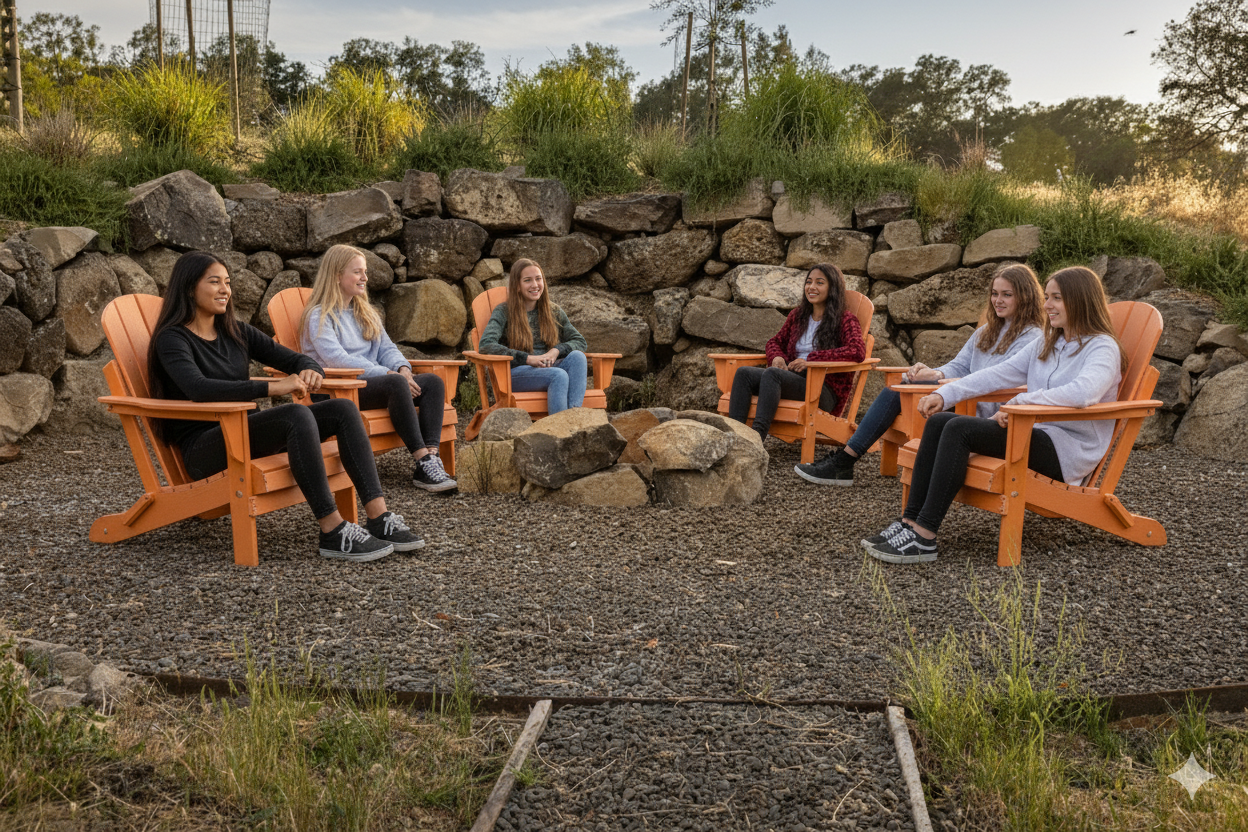Teen group therapy for teens is an important psychotherapeutic tool.
When substance abuse enters the picture, the negative aspects of adolescence are magnified, leaving family members feeling helpless and frightened. Teenage boys who become addicted to drugs are more likely to engage in high-risk behaviors like driving under the influence, having unsafe sex, getting into altercations and sharing needles with IV drug users. From their early experiments with drugs and alcohol to the final stages of addiction, boys are likely to be influenced by peer pressure. This is why group therapy for teenage boys can prove to be extremely effective.
Group therapy for teens in Sonoma, CA plays a critical role in substance abuse treatment for adolescents.
The purpose of this form of therapy is to replace negative peer pressure with the positive support of other teens who are fighting the same battle. Instead of being influenced by kids who encourage them to engage in self-destructive behavior, teens in group therapy sessions are surrounded by others who share their hopes, fears and challenges. Throughout the recovery process, group therapy provides these valuable benefits:
- Providing a nonjudgmental forum where boys can voice their feelings without being criticized or shamed
- Creating an environment of support for teens who are looking for a way out of the trap of addiction
- Giving teens the opportunity to form relationships with peers who share their commitment to sobriety
- Finding acceptance in a healthy, drug-free group
Many boys who enter our addiction treatment program realize that our teen group therapy in Sonoma is their first opportunity to speak the truth about their chemical dependence. Boys who have led a life of secrecy, isolation and denial can share their experiences openly with others. This process is where true recovery begins.
The Power of Peers
How powerful is peer pressure to growing teens? Scientists at Temple University used brain scans to visualize the changes that take place in the adolescent brain when it responds to peer pressure. In the study, adults and teenagers participated in a simulated driving course while in a brain scanner. The course presented many opportunities for decision-making, and participants were offered prizes for completing the course more quickly. Both groups completed the driving video game alone and in the presence of a group of their peers.
The results of this study, published in Developmental Science, indicated that the teenage brain responds much more strongly to peer influence than the adult brain.
The areas of the brain that respond to reward were much more active in the teenage drivers when they were being watched by other teens — especially when those teenage drivers were taking risks. The teenagers were more likely to run yellow lights, speed through stop signs and have accidents during the simulated driving experience when they knew that their peers were looking on. In fact, the teenage drivers were 60 percent more likely to have a collision when they were being observed by other teens.
By the same token, teens are more likely to take risks with drugs or alcohol when their friends are involved. According to the University of Michigan, peers can play a part in substance abuse in the following ways:
- By introducing each other to drugs or alcohol
- By acting as negative role models who encourage drug abuse in others
- By providing access to drugs
- By covering up for a friend’s substance abuse
- By influencing other teens’ attitudes about drugs
The purpose of teen group therapy is to replace these destructive influences with healthy, life-affirming ones. Teens in a support group speak honestly about their addiction, hold each other accountable for their decisions, and act as positive role models for each other. Instead of helping each other obtain drugs, they teach each other the coping skills they need to lead a drug-free life.
Teen Substance Abuse in Boys vs. Girls
According to the National Institutes of Health, males are generally more likely to engage in substance abuse than females – regardless of their age. Although statistically, boys are more prone to substance abuse, recent studies conclude that teenage girls are beginning to close the gender gap. In fact, a study was released by the Substance Abuse and Mental Health Services Administration (SAMHSA) that concluded roughly 50% of teens are abusing substances across both genders. Furthermore, according to the National Survey on Drug Use and Health, boys in their teenage years are almost twice as likely to report dependence on illicit drugs. The same survey shows that there are use pattern differences in genders. For instance, boys are more likely to fall prey to marijuana and alcohol abuse, whereas teen girls are more likely to engage in prescription drug abuse. In addition to getting group therapy for teens in Sonoma, understanding how gender impacts addictions is an important part of getting any teen proper treatment.
Helping Teenage Boys Help Each Other Through Group Therapy
Peer group therapy can begin as early as the detox phase and continue throughout substance abuse treatment. Support groups and self-help meetings are also vital in the aftercare stage, when the skills learned in rehab must be applied in a “real life” setting. In order to be effective, peer group therapy should be structured and facilitated by experienced addiction specialists. Our teen group therapy in Sonoma is conducted by a therapist, counselor or psychiatrist who is credentialed in both adolescent development and addiction treatment.
The facilitator’s job is not to confront the group members or to criticize their behavior. Instead, this therapist’s role is to provide structure and to act as a neutral intermediary in guiding the discussion. The therapist also acts as an educator, instructing the group on a wide range of topics related to substance abuse and recovery. In the course of a session, a facilitator’s role includes:
- Providing structure for the session by enforcing group rules, such as being on time and allowing each member to speak in turn
- Offering a discussion topic or allowing the group to choose a topic that’s relevant to their recovery
- Encouraging open, honest communication among group members
- Discouraging cross-talk, criticism or confrontational behavior
- Validating each member’s experiences and self-expression
- Identifying group members who are at risk of a relapse
- Acting as a role model and advocate for a healthy, drug-free life
- Creating an emotionally safe environment where each member feels acknowledged, respected and values
When conducted by caring, compassionate professionals, peer group therapy can be one of the most influential aspects of a teenager’s recovery.
A review of studies published in the Journal of Clinical Child and Adolescent Psychology showed that peer group therapy has been one of the mainstays of adolescent addiction treatment since the 1990s. Perhaps the most important purpose of group therapy is to give isolated teens a secure, self-affirming environment that makes them feel cared for and valued.
Gender-Specific Group Therapy Models for Teens
Teenagers are more likely to be open about substance abuse when they don’t feel inhibited or self-conscious. In a gender-specific environment, adolescents can talk more freely about sensitive issues like sexuality, physical abuse and mental illness. Without the social pressures of dealing with the opposite sex, teenage boys can focus exclusively on their recovery. Boys who have felt neglected or undervalued in the outside world can feel validated in this supportive setting.
Gender-specific therapy models for boys acknowledge the unique challenges faced by teenage males. Many of the boys who enter treatment have grown up without positive male role models. Some have been physically, psychologically or sexually abused by men in positions of trust and authority. In gender-specific groups, boys can explore these painful topics in an atmosphere of safety and compassion.
Teenage boys who don’t get the support they need to overcome drug abuse may face a violent future. A survey of incarcerated males published in Substance Abuse and Misuse found that 59 percent had been sexually abused as children. The members of this group were up to 30 percent more likely to have engaged in substance abuse than those who were not abused. For a lot of troubled teens, recovery isn’t just about healing from addiction but about healing from the trauma of a destructive, unstable childhood. In addition to group therapy, addicted teens work intensively with individual counselors to address the feelings and memories that drive their substance abuse.
Group therapy offers vital emotional support at this transitional time. Group members learn critical coping skills from each other and from their facilitator, such as:
- How to replace self-defeating thought patterns with positive ones
- How to identify the situations and emotions that trigger substance abuse
- How to form strong, healthy relationships with peers and family
- How to make the transition from boyhood to adulthood successfully
- How to create a sober, fulfilling life as a mature man
Whether the focus is on relapse prevention, psychosocial education or identity-building, peer group sessions create a place for healing to occur.
Supplemental Therapies in Addiction Treatment for Teens
Peer group therapy is only one component of a comprehensive recovery program. Along with the traditional cornerstones of treatment, like individual counseling, family counseling, and peer support groups, innovative treatment centers offer supplemental therapies that reinforce the skills learned in therapy. These modalities include experiential and adventure therapy, where teens build a sense of self-confidence, trust, and accountability through rigorous, hands-on experience.
Family therapy programs address the fact that adolescent addiction is not an individual problem but a family disease. The goal of family counseling is to create a sober home environment that supports the health of all the members of the household. Therapists work closely with teens and their parents or guardians to heal broken bonds, establish boundaries, and promote an atmosphere of trust and hope.
At Muir Wood, we specialize in guiding troubled teenage boys through the process of becoming men. Group therapy for teenage boys is a core component of that process. Our groups are led by highly credentialed professionals who understand the obstacles and pressures that boys face. We encourage you to call our treatment team to talk about how our evidence-based treatment plans can help the teenager in your life grow successfully through this challenging phase of his life.
Signs That A Teenage Boy Is Abusing Drugs Or Alcohol
Because every teenage boy is different, it might be challenging to pinpoint signs that indicate your teen might be abusing drugs or alcohol. However, there are common clues that can indicate a problem in your teenage boy. The key to assessing the condition of your teen is to be observant, and proactive, and communicate with him. That said, here are some signs to look for if you suspect your teenager is using drugs or alcohol:
- He is no longer interested in activities, sports, or hobbies that he used to enjoy
- Grades might begin to drop at school, a lack of studying, or failure to complete school assignments. He may also skip classes at school
- He becomes more withdrawn and isolated. Stops hanging out with friends or family
- His appearance has changed and/or he pays less attention to personal hygiene
- Bloodshot eyes, smells of alcohol or smoke
- He may be lethargic, preferring to sleep longer than usual
- Seems distant, confused, or disoriented
- Has become secretive, avoiding eye contact and/or getting caught telling lies
- Expresses mood swings. He may be euphoric one moment and despondent the next
- Displaying aggression, anger, or rage
- He may show signs of depression, being uncommunicative and sullen
- Unable to focus, easily distracted, erratic behavior
When to Seek Addiction Help for Your Teenage Boy
Clearly, if your child is a danger to himself or others, you should seek treatment. You should also seek immediate help if your teenage boy has attempted suicide or talks about suicide. Furthermore, if your teenage boy is displaying some of the signs of drug and alcohol abuse mentioned earlier, then it is important to get a deeper assessment of his condition. At Muir Wood, we understand that every situation is different. If you are concerned for your teenage boy, then that is a compelling enough reason to seek help. When you contact us, we can assess your teenager’s condition and recommend a path of action going forward, such as psychotherapy and group therapy for teen boys in Sonoma, CA.
Why Choose Muir Wood’s Group Therapy for Teen Boys
When you do an internet search for “teen group therapy near me,” we know you have several options to choose from. However, when you place your teenage boy into our care, we are providing your child with the highest quality therapy available. Our commitment to your teen’s mental and physical health is our number one priority. We provide a safe haven for troubled teens so that they may feel at ease to share their feelings and express their emotions without the fear of judgment. When you are seeking group therapy for teen boys in Sonoma, Muir Wood is the most caring, effective, and qualified option.
Get Help Today at Muir Wood
Our compassionate team members understand substance and alcohol abuse in teens can be complicated, frightening, and difficult to deal with. That is why our treatment programs and our teen group therapy in Sonoma, CA are ranked the best in the nation. If your teen is struggling, contact us today. We are here to help, and we understand what you and your teen is going through.
Muir Wood Teen Treatment Is Here to Help
Group Therapy For Teen Boys FAQs
According to the National Institute on Drug Abuse, cannabis (pot, marijuana) is the most common drug abused by teens. The second most common substance abuse is prescription medications. Teens also commonly abuse over-the-counter (OTC) drugs such as cough syrups, decongestants, or cold medicines for their stimulant properties. Alcohol is overwhelmingly the most common substance teens abuse. It is not always easy to determine how many teens use LSD, cocaine, meth, or heroin, but that does not mean they are not a threat to teens today. Simply because statistics show certain drugs or substances are more commonly abused by teens than others does not eliminate the reality that our teens can attain substances if they are motivated to do so.
A support group is typically designed to help people cope with certain situations, such as a person who is struggling with grief over the loss of a loved one. Support groups can be helpful when an individual needs to share their feelings in a safe environment to process their feelings. Group therapy is a results-focused, organized therapy that is meant to facilitate healing and positive changes among the attendees. Members of group therapy are encouraged to learn skills together that facilitate improved behaviors and encourage members to make better choices. Group therapy is goal-oriented and allows members to share and exchange their thoughts in a supportive, nonjudgmental environment.
There are many advantages to group therapy for teens. Namely, teens learn they are not alone, and can more easily share their experiences with those in their same age group going through the same struggles they are. There is a sense of “we’re all in this together” in group therapy. Furthermore, members learn to trust one another and build teamwork skills and the concept of shared responsibility, which is crucial to healing and living more effectively in the world. Because not all teens are created equal, there may be personality conflicts in group therapy, which can be a disadvantage. The potential for conflict may arise, but an experienced clinician should be able to diffuse this if it occurs.









